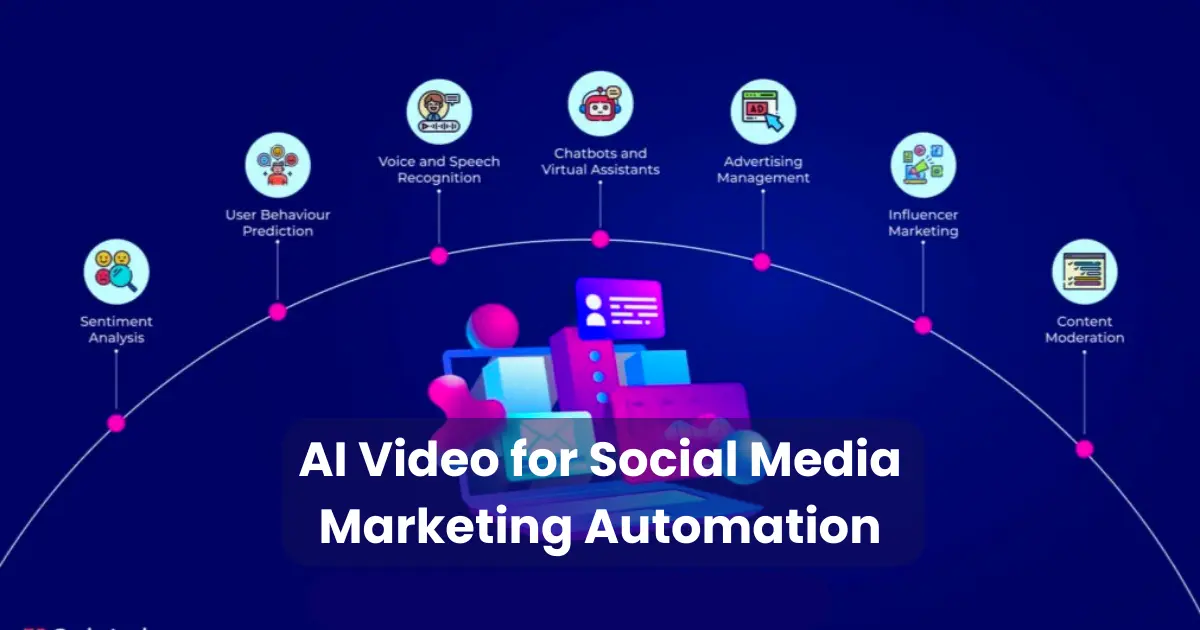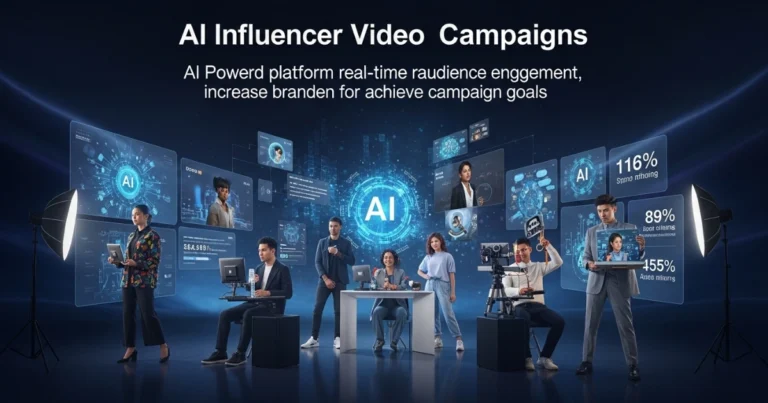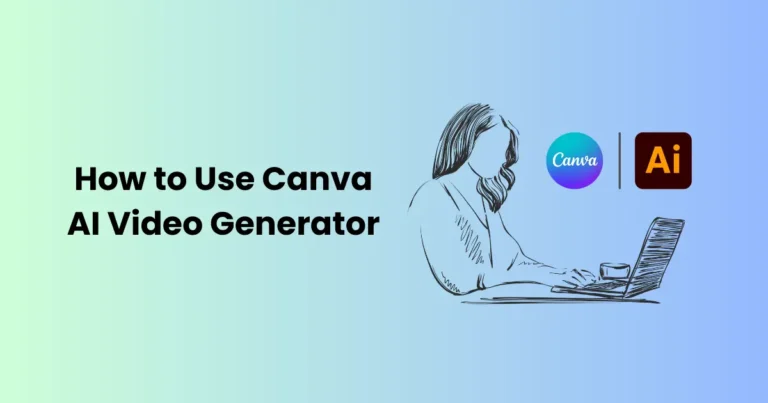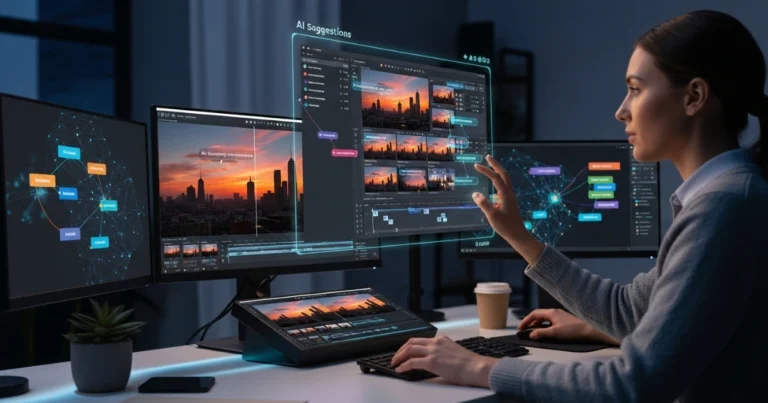AI Video for Social Media Marketing Automation

Contents
- 1 What Is AI Video?
- 2 The Rise of Social Media Marketing Automation
- 3 Benefits of AI Video in Social Media Marketing
- 4 How AI Video Works for Marketing Automation
- 5 Best Tools for AI Video in Marketing Automation
- 6 Real-World Case Studies
- 7 Challenges and Limitations
- 8 Future of AI Video in Social Media Marketing
In today’s fast-paced digital world, AI video for social media marketing automation is becoming a powerful tool for businesses striving to stay relevant and competitive. By combining the power of artificial intelligence with the reach of social media platforms, marketers can now create, customize, and distribute video content with unprecedented efficiency and precision.
Previously, video marketing required significant time and resources. Now, thanks to automation, content can be generated, optimized, and scheduled with minimal manual input. Additionally, marketers benefit from AI’s ability to analyze audience behavior, adjust messaging, and ensure the right content reaches the right people at the optimal time. As a result, engagement is increased, workflows are streamlined, and return on investment is maximized.
What Is AI Video?
AI video refers to video content that is generated, enhanced, or edited through artificial intelligence technologies. It involves the use of machine learning algorithms, natural language processing, and computer vision to automate video creation tasks that were once handled manually. Through AI, video production has been streamlined, making it more accessible and scalable for marketers.

In most cases, AI video tools are used to convert text into engaging visuals, generate voice-overs using synthetic voices, apply auto-subtitles, and even animate avatars that speak in multiple languages. This content can be produced in bulk and adapted to fit various social media platforms, all with little human intervention.
For example, a blog post can be analyzed and transformed into a short, eye-catching video tailored to Instagram stories or LinkedIn posts. In this way, AI video for social media marketing automation is being adopted by brands that want to maintain a strong online presence without exhausting resources.
While the process was traditionally time-consuming and costly, AI has made video creation more efficient and cost-effective. Through the use of data and intelligent automation, customized videos can now be produced quickly and published across multiple channels with ease.
The Rise of Social Media Marketing Automation
Over the past decade, social media has evolved from a digital networking tool into a powerful marketing engine. As platforms like Instagram, Facebook, TikTok, LinkedIn, and YouTube grew in influence, so did the demand for continuous, high-quality content. To meet this demand efficiently, social media marketing automation was introduced—and it has since reshaped how brands communicate online.

Through automation, tasks such as content scheduling, post recycling, comment moderation, and performance tracking have been streamlined. As a result, teams are now able to focus on strategy and creativity, rather than repetitive manual work. This shift has led to the widespread adoption of smart tools designed to handle everything from publishing to analytics.
Furthermore, with the integration of AI video for social media marketing automation, the game has changed even more dramatically. Rather than relying on large production teams or endless editing hours, marketers can now generate attention-grabbing videos using AI—customized for each platform and audience segment.
The rise of automation has not only improved efficiency but also consistency. Content calendars are kept full, audiences stay engaged, and campaigns maintain momentum—even outside working hours. In this way, automation ensures that brands remain visible and relevant in an increasingly competitive digital landscape.
Most importantly, this evolution has leveled the playing field. Small businesses and startups now have access to the same tools as global corporations, allowing them to scale their efforts and compete with minimal resources.
Benefits of AI Video in Social Media Marketing
As digital competition intensifies, the benefits of AI video for social media marketing automation have become more apparent. From saving time to boosting engagement, AI-powered video content is transforming how brands connect with audiences online.

1 Improved Engagement
First and foremost, AI-generated video content has been shown to increase user interaction. Social media algorithms favor video, and when those videos are tailored to audience preferences, watch times and shares rise. Using AI, content can be automatically optimized for each platform—ensuring that format, length, and visuals align with user expectations.
Additionally, AI tools can analyze viewer behavior in real time. Based on this data, future videos are adjusted to better meet the needs of each segment, increasing the likelihood of consistent engagement.
2 Time-Saving Automation
One of the most significant advantages is the time that can be saved. Traditional video production involves multiple stages—scripting, filming, editing, and post-production. With AI, many of these steps are automated. Videos can be created in minutes rather than days.
Moreover, entire video campaigns can be scheduled across platforms, ensuring content is published even when teams are offline. Because of this, marketers can focus more on strategic planning and less on content logistics.
3 Personalized Content Creation
AI video tools enable marketers to create hyper-personalized content. By pulling in user data such as names, locations, or past interactions, customized videos can be generated for individual users or niche groups.
For instance, a single campaign can produce hundreds of video variants—each tailored to a different customer segment. This level of personalization has been linked to higher conversion rates and deeper brand loyalty, especially when combined with marketing automation workflows.
4 Consistent Brand Messaging
AI ensures that brand guidelines are consistently applied across all content. Fonts, colors, voiceovers, and messaging templates can be pre-set and used uniformly, reducing errors and off-brand visuals. Consistency in presentation builds trust, especially when scaling campaigns across regions or demographics.
5 Enhanced ROI
Finally, automation and personalization lead to better return on investment. Because production costs are reduced and content performance is improved, marketing budgets can be stretched further. Many businesses have seen measurable increases in leads and sales after integrating AI video for social media marketing automation into their strategies.
How AI Video Works for Marketing Automation
Understanding how AI video for social media marketing automation functions can help marketers unlock its full potential. At its core, this process leverages artificial intelligence to streamline the creation, personalization, and distribution of video content across multiple platforms.

1 Content Input and Script Generation
The process typically begins with a data input—this could be a blog post, product description, or even bullet points. AI algorithms analyze the content to extract key points and generate an engaging video script. Natural language processing is used to ensure the tone and structure match the target audience.
Scripts can be adjusted automatically to match platform-specific character limits and content styles. For instance, a longer LinkedIn video can be shortened into a punchy Instagram Reel—without needing to start from scratch.
2 Visual and Audio Rendering
Once the script has been finalized, visuals are selected or generated using AI. These can include stock videos, animations, text overlays, and avatars. AI tools can even recommend or auto-generate visuals based on script keywords and context.
Synthetic voiceovers are added using text-to-speech engines. These voices can be customized in terms of tone, pace, and accent—providing a professional sound without hiring voice actors. Subtitles and translations are also created automatically, helping the content reach a broader audience.
3 Personalization at Scale
What makes AI video for social media marketing automation truly powerful is its ability to personalize content at scale. User data—such as name, location, and purchase history—can be integrated to create thousands of customized video versions for different audience segments.
By using pre-set rules or AI-driven suggestions, each user receives content that feels directly relevant to them. This deep level of personalization was once costly and time-consuming, but with AI, it is done in seconds.
4 Automated Publishing and Optimization
Once videos are created, they are automatically scheduled and published across chosen platforms. AI tools analyze the best times to post, taking into account audience behavior, time zones, and platform algorithms.
After publishing, performance data is gathered and analyzed. Based on these insights, AI systems recommend changes or automatically adapt future video content. Through this loop, campaigns are continuously refined for better results.
Best Tools for AI Video in Marketing Automation
To fully harness the power of AI video for social media marketing automation, the right tools must be selected. These platforms offer advanced features for video generation, personalization, scheduling, and analytics—all within user-friendly interfaces. Let’s explore some of the best AI video tools currently available for marketers:

1 Pictory
Pictory enables users to turn long-form content like blog articles or webinars into short, shareable videos. Scripts are generated using AI, while visual and audio elements are matched automatically. Due to its text-to-video capabilities and social media integrations, it’s ideal for rapid content repurposing.
2 Lumen5
Lumen5 transforms written content into branded videos in just minutes. Its drag-and-drop functionality and AI-driven visual suggestions simplify the process. Marketers benefit from customizable templates, branding kits, and automatic scene transitions that make the platform especially valuable for automation-focused campaigns.
3 Synthesia
Synthesia stands out for its realistic AI avatars and multilingual voiceover capabilities. Users can create spokesperson-style videos without any filming required. This is especially useful for global brands that want to automate explainer videos, tutorials, or product promotions.
4 Animoto
With Animoto, marketers can quickly assemble video content using pre-set storyboards. The AI suggests relevant visuals and music, and videos can be optimized for different platforms automatically. It’s particularly well-suited for small businesses looking for professional output with minimal effort.
5 InVideo
InVideo offers advanced editing powered by AI, including script assistance, automated voiceovers, and platform-specific formatting. It’s known for its versatility and wide range of templates, making it useful for everything from short social media clips to longer promotional content.
6 Vidyard
Vidyard combines video creation with detailed analytics. It’s a powerful platform for those who want to track viewer engagement and integrate video with CRM or email marketing software. AI helps recommend improvements and A/B test different formats to optimize performance.
Each of these tools enhances the workflow and scalability of AI video for social media marketing automation, helping businesses produce better content faster. Whether your focus is storytelling, conversion, or brand visibility, these platforms can be tailored to suit your strategy.
Real-World Case Studies
To understand the true impact of AI video for social media marketing automation, real-world applications offer the clearest proof. Across industries, businesses are leveraging AI-powered video to increase efficiency, improve engagement, and drive results—often with smaller teams and tighter budgets. Below are some standout examples.

1 Sephora: Personalization at Scale
Sephora, a global cosmetics leader, implemented AI video tools to deliver personalized product tutorials and recommendations. By analyzing customer preferences and purchase history, the company generated individualized video content—complete with custom text overlays and voiceovers.
As a result, customer engagement rose by 32%, and click-through rates on social media campaigns doubled. The content was automatically scheduled for posting, further reducing the workload on the marketing team.
2 HubSpot: Thought Leadership Through Video
To maintain a steady stream of educational content, HubSpot integrated AI video for social media marketing automation. Their blog articles and webinar transcripts were converted into bite-sized, branded videos using tools like Lumen5.
Because publishing was automated, new videos appeared across platforms weekly without delay. Engagement rates increased by 40%, and video watch time tripled compared to non-AI content.
3 Real Estate Agencies: Automated Listings
Small and mid-sized real estate agencies began using Synthesia to create AI-generated videos for new property listings. These videos featured AI avatars acting as digital agents, presenting listings in multiple languages.
By integrating video creation into their CRM systems, new listings were promoted automatically on social media channels. In some cases, property inquiries increased by up to 60% due to the professional, always-on presentation.
4 E-Commerce Startups: Launching with Lean Teams
A fashion startup with limited resources used Pictory and InVideo to produce launch campaign videos. Product descriptions and lifestyle images were fed into AI systems, which generated dozens of promotional clips within hours.
Thanks to automated scheduling and cross-platform optimization, the brand achieved 4x growth in follower count within the first two months—without hiring a full creative team.
These examples show how AI video for social media marketing automation is more than just a trend—it’s a powerful tool for modern digital strategy. Whether for large corporations or emerging startups, it enables scalable, cost-effective content creation with measurable impact.
Challenges and Limitations
While the advantages of AI video for social media marketing automation are undeniable, the approach is not without its challenges. As with any evolving technology, marketers must be aware of both technical and strategic limitations in order to maximize their return and avoid common pitfalls.
1 Limited Creative Flexibility
Although AI tools can produce videos quickly, their creative range may be limited. Templates, while efficient, can lead to repetitive or generic results if not carefully customized. For campaigns that demand a unique or emotionally rich narrative, human creativity is still essential.
Additionally, AI-generated visuals and voiceovers might not capture the subtleties of branding or storytelling that a professional production team can offer. Because of this, hybrid workflows—where AI is combined with human input—are often preferred.
2 Data Privacy and Personalization Concerns
AI-powered personalization relies heavily on user data. While this enables more relevant video content, it also introduces concerns around data privacy and regulatory compliance. Marketers must ensure that AI systems comply with data protection laws such as GDPR and CCPA.
Furthermore, poorly executed personalization may appear intrusive rather than helpful. For example, using a person’s name or behavior data without context can lead to discomfort or even distrust from the audience.
3 Platform Compatibility and Technical Glitches
Despite efforts toward universal optimization, not all AI-generated content functions perfectly across every platform. Formatting issues, audio syncing errors, or slow loading speeds can arise—especially on mobile devices with limited bandwidth.
Moreover, some automation tools may not integrate smoothly with a brand’s existing CRM or content management systems, requiring manual intervention or API customization.
4 Risk of Over-Reliance on Automation
Finally, while AI video for social media marketing automation can significantly reduce effort, over-reliance may lead to strategic complacency. Automated content that lacks fresh insights, storytelling, or creativity may fail to resonate with evolving audiences.
Because of this, it’s crucial to maintain a balance. Automation should be used to amplify creativity—not replace it. Continuous monitoring, human oversight, and regular performance evaluations are essential for long-term success.
These limitations highlight the importance of strategic planning when adopting AI solutions. Although challenges exist, they can be effectively managed with thoughtful implementation and regular evaluation.
Future of AI Video in Social Media Marketing
As technology continues to evolve at an extraordinary pace, the future of AI video for social media marketing automation appears more promising than ever. What started as a tool for efficiency is rapidly transforming into a cornerstone of digital strategy across industries.

1 Smarter Personalization Through Predictive AI
Moving forward, we can expect AI tools to become even more intuitive. Predictive analytics, powered by machine learning, will anticipate audience behavior and automatically generate video content tailored to shifting interests and trends. These dynamic content adaptations will help brands stay relevant in real time.
Furthermore, real-time feedback loops will allow marketers to instantly tweak video elements—such as voice tone, visual style, or call-to-action placement—based on viewer interaction data. As a result, user engagement could reach unprecedented heights.
2 Hyper-Realistic Avatars and Voice Cloning
AI avatars and voices are expected to become more lifelike and emotionally intelligent. Thanks to advancements in generative AI, future avatars will not only mimic human appearance and speech but also replicate facial expressions, gestures, and even micro-emotions with stunning realism.
This leap will unlock new opportunities for personalized influencer-style videos, customer service via AI hosts, and multilingual global marketing campaigns—all automated and scalable.
3 Deeper Integration with Marketing Ecosystems
Another key trend will be the tighter integration of AI video for social media marketing automation with larger marketing ecosystems. Expect deeper connectivity with CRMs, eCommerce platforms, chatbots, and analytics dashboards.
This interconnectedness will allow brands to seamlessly pull customer insights into their video content, run predictive A/B tests, and automatically adjust publishing strategies for higher ROI.
4 Democratization of High-Quality Video Production
Perhaps most importantly, these innovations will continue to lower the barrier to entry for high-quality content creation. Small businesses, solopreneurs, and nonprofit organizations will be able to compete with major brands in video marketing—without large production budgets or technical expertise.
AI will empower storytellers from all backgrounds to create, automate, and share impactful messages at scale.
Conclusion
In today’s fast-paced digital landscape, AI video for social media marketing automation is no longer a luxury—it’s a necessity. By harnessing the power of AI, marketers can streamline content creation, personalize user experiences at scale, and optimize social media campaigns with efficiency and precision.
As we’ve seen through real-world case studies, the impact of AI video is clear: businesses of all sizes are leveraging this technology to enhance engagement, boost ROI, and stay competitive. However, it’s important to approach AI-driven video creation thoughtfully—balancing automation with creativity, ensuring data privacy, and avoiding over-reliance on technology.
Looking ahead, the potential for AI video in marketing is boundless. With smarter tools, hyper-realistic avatars, and deeper integration into marketing ecosystems, the future holds exciting opportunities for those willing to embrace change.
By staying ahead of the curve and adapting to these innovations, brands can continue to captivate audiences, enhance their digital presence, and create meaningful, automated video content that resonates.






